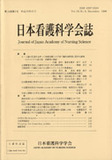Japanese
English
- 販売していません
- Abstract 文献概要
- 参考文献 Reference
- サイト内被引用 Cited by
要旨
本研究の目的は,父親役割への適応における父親のストレスとその関連要因を明らかにすることである.2~5ヶ月児の父親183名を対象として質問紙調査を行い、以下の結果を得た.1)児出生後2~5ヶ月において,父親役割に関連して経験するストレスは決して高いとは言えず,父親であることに喜びを感じている.2)父親になったという事実について肯定的に捉えている者はストレスが低く,社会的支持に対する満足度が高い者ほどストレスが低い.また対処については,前向きに努力していたり肯定的に考えていたりする者はストレスが低く,父親役割遂行に対して消極的な態度をとっている者はストレスが高い傾向にある.3)子ども1人の父親では,夫婦関係が良く,出産体験についての満足度が高く,妻が就業しておらず,出産準備クラスへ参加した者の方が,よりストレスが低い.子ども2人以上の父親では,夫婦関係が良く,育児の手伝いがいない者の方が,よりストレスが低い.
以上の結果より,父親役割への適応を促すためには,まず父親が子どもの誕生や父親役割をどのように捉えているか,必要な社会的支持があるのか,生活や役割の変化に対してどのように対処しているのか,これら3点をアセスメントすることが重要なことが明らかとなり,いくつかの看護援助の有効性が示唆された.
Abstract
The purpose of this study was to determine the degree of stress encountered by fathers during the adaptation to fatherhood process, and to examine the relationships between a father's level of stress and twelve conditions, which included: perception of the role of father, social support, coping mechanisms, marital relationship, wife employ-ment status, family's income, working hours outside of home, educational background, desire/or not to have a child, level of satisfaction with labor experience, attendance at prenatal classes, and prior experience with infants. Data was collected using survey methodology. One hundred and eighty-three fathers who had infants between the ages of two and five months completed the questionnaire. Findings included the following: 1) Two to five months after birth, the degree of father's stress of father's role was not nec-essarily high. This may be because the fathers had found gratification in their role of fatherhood. 2) The level of the father's stress was related to the father's perception of his role, social support, and coping mechanisms. Fathers who had a positive perception of their role and a higher level of satisfaction with their social support systems showed lower levels of stress. In addition, fathers who had positive attitudes toward their father role showed lower levels of stress, while fathers who's attitudes were passive showed higher levels of stress. 3) Inexperienced fathers, those who had better marital relation-ships and higher satisfaction with labor experiences, showed lower levels of stress. In addition, inexperienced fathers, who's wives did not have a job outside of the home and attended prenatal classes, showed lower levels of stress. Experienced fathers, those who had better marital relationships and actual supporter for infant's care, showed lower lev-els of stress.
These findings suggest that it is important to assess new fathers to determine how they perceive their father's role, whether they have the necessary social support, and how they cope with the change in their daily lives and their additional roles. Finally, nursing interventions could help fathers adapt to their new roles of fatherhood.
Copyright © 1998, Japan Academy of Nursing Science. All rights reserved.


